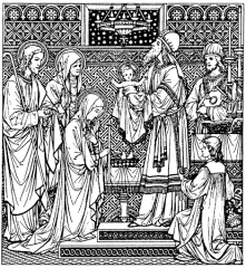
IT is the festival on which the Church venerates the humility and obedience of Mary who, though not subject to the law of Moses, which required purification and presentation in the temple, yet subjected herself to it. From this comes the name Purification of the Blessed Virgin Mary, or the Presentation of Jesus in the temple. It is also called Candlemas, because before Mass on this day the candles used in divine service are blessed and carried in procession.
Why are the candles blessed on this day and carried in procession?
In remembrance of the presentation of Jesus to His Heavenly Father on this day, when the aged Simeon called Him: A light to the revelation of the Gentiles, and the glory of the people of Israel, (Luke ii. 32.) and to remind us that, like the five wise virgins, we should go to meet Christ with the light of faith and good works.
With what intention are candles blessed?
With the intention of obtaining from God by their pious use and the prayers of those who devoutly carry them, health of body and soul; that our hearts, through the doctrine
of Jesus and the grace of the Holy Ghost, may be interiorly enlightened; and that the fire of the love of God may be kindled in our hearts, purify them from all remains of sin, and make us partakers in the joyous light of heaven, which will never be extinguished.
The Introit of the Mass is:
We have received Thy mercy, O God, in the midst of Thy temple: according to Thy name, O God, so also is Thy praise, unto the ends of the earth: Thy right hand is full of justice. Great is the Lord, and exceedingly to be praised: in the city of our God, in His holy mountain. (Ps. xlvii.) Glory &c.
PRAYER OF THE CHURCH. Almighty, everliving God, we humbly beseech Thy Majesty, that as Thine only-begotten Son was this day presented in the temple in the substance of our flesh; so we also may, with purified hearts, be presented unto Thee. Thro'. &c.
LESSON. (Malach. iii. i 4.) THUS SAITH THE LORD GOD: Behold, I send my Angel, and he shall prepare the way before my face. And presently the Lord, whom you seek, and the Angel of the testament, whom you desire, shall come to his temple. Behold, he cometh, saith the Lord of hosts, and who shall be . able to think of the day of his coming, and who shall stand to see him? For he is like a refining fire, and like the fuller's herb: and he shall sit refining and cleansing the silver, and he shall purify the sons of Levi, and shall refine them as gold and as silver: and they shall offer sacrifices to the Lord in justice. And the sacrifice of Juda and of Jerusalem shall please the Lord, as the days of old, and the ancient years : saith the Lord Almighty.
EXPLANATION. The angel or messenger who shall prepare the way for the Lord, is John the Baptist, (Matt. xi. 10.) and the long desired Ruler and Messiah is Christ, who on this day comes into his temple. He is called the Angel of the testament, because He has arranged between God and man a new and far more excellent covenant than God had made with the Jews; inasmuch as He has given to the Christians not merely temporal but eternal good. This Angel of the testament, Christ, came the first time in all the humility of a little child into the temple, but His second coming at the end of the world will be terrible. The prophet likens Him to a fire which purifies the gold, and to that herb with which cloth is whitened in the fuller's machine; under which figures he alludes to the severity of judgment, with which Christ will judge the just and the unjust. Pure as refined gold, and as the white linen (corporal) on which the Body of Christ is laid in the holy Sacrifice of the Mass, must be the heart of those who receive Christ in the blessed Sacrament, or seek worthily to offer the holy Sacrifice with the priest.
GOSPEL. (Luke ii. 22 32.) AT THAT TIME, After the days of Mary's purification, according to the law of Moses, were accomplished, they carried Jesus to Jerusalem, to present him to the Lord, as it is written in the law of the Lord: Every male opening the womb shall be called holy to the Lord. And to offer a sacrifice, according as it is written in the law of the Lord, a pair of turtle doves, or two young pigeons. And behold, there was a man in Jerusalem named Simeon, and this man was just and devout, waiting for the consolation of Israel, and the Holy Ghost was in him. And he had received an answer from the Holy Ghost, that he should not see death, before he had seen the Christ of the Lord. And he came by the Spirit into the temple. And when his parents brought in the child Jesus, to do for him according to the custom of the law: he also took him into his arms, and blessed God, and said: Now thou dost dismiss thy servant, O Lord, according to thy word, in peace: Because my eyes have seen thy salvation: which thou hast prepared before the face of all peoples: a light to the revelation of the Gentiles, and the glory of thy people Israel.
Why was Jesus brought into the temple of Jerusalem?
That He might be offered to God, who had commanded the Jews to offer their first-born sons to Him in grateful commemoration of the destroying angel having spared their first-born at the departure from Egypt, when all the firstborn of the Egyptians were slain. (Exodus xii. 12.) These children had to be redeemed afterwards by certain gifts. (Exodus xiii. 13.)
How soon after birth was this offering to be made?
On the fortieth day; for according to the law the mother's impurity lasted for this length of time after the birth of a boy, after which she went to the temple, and in order to be declared purified, made her offering of purification. (Lev. xii.)
Was Mary subject to this law of purification?
No, for she had not, like other mothers, conceived in sin, and, therefore, did not need purification ; but she placed herself with her divine Child among sinners and fulfilled the law by which these were bound. "Nothing", says St. Bernard, "was impure in her conception, nothing impure in her birth; there was nothing to be cleansed, for the Child itself was the origin of all purity, and came into the world to purify it from sin.' Truly, O happy Virgin, thou wast not in need of purification, but thou wouldst pass as a woman among women, as thy Son also passed for a child among children."
Why did Mary comply "with the law of purification?"
She did this to give us an example of obedience and true humility, for she interiorly thought little of herself and wished externally to be so regarded; to teach us to thank God for the favors He has shown to our ancestors, for the law of the Jews was given to encourage them to gratitude for the preservation of the first-born of their ancestors from the hands of the destroying angel; (Exodus xii. 12.) and in order not to scandalize, by being regardless of this law, those who did not know that she was not required to observe it.
Learn, O Christian, from Mary's example to be truly humble and obedient, to be grateful to God for the benefits which your ancestors and parents have received, and to be on your guard never to give scandal, by failing to observe the commandments of God and His Church.
Why did not Mary offer a lamb as did the rich, (Lev. xii. 6). but merely, like the poor, a pair of doves?
Because she was poor, and was not ashamed to appear as such before the world. Mary loved humility and the poverty connected with it. Be not ashamed, therefore, if thou art poor, love poverty the more; but if rich, be poor in spirit, and love the poor and distressed.
How did it come to pass that Simeon met the Saviour in the temple?
Because he was a pious and faithful servant of God, it had been promised him that he should not die, until he had seen the Saviour. When Jesus was brought into the temple, Simeon was inspired by God to go there also, and when he found Jesus there, he by divine inspiration knew Him to be the Messiah, and gave testimony of Him. See how God rewards those who sincerely love and serve Him, giving Himself to them to be known always more and more!
Why was Simeon ready to die when he had held Jesus in his arms?
Because his wish was fulfilled; for since he had not only seen with his own eyes, but had held in his arms the Desired of all nations, for whom the patriarchs had so vainly longed, what more could he wish than to leave this miserable world, and commend his spirit into the hands of his Saviour?
Why did Simeon call Jesus a light for the revelation of the Gentiles ?
Because Jesus had come into the world as the true light, (John i. 9) which was to free the Gentiles from the darkness of superstition and idolatry, and from the blindness and slavery of Satan, as well as to conduct the Jews out of the bondage of the Mosaic Law into the liberty of the children of God. (Gal. iv. 31.)
PRAYER. Heavenly Father! look down from Thy throne of mercy upon the face of Thy Anointed in whom Thou art well pleased. Behold, He is this day offered to Thee in the temple for the sins of His brethren. Let this offering please Thee, and move Thee to have compassion on us sinners. In consideration of His humility and obedience, forgive us our pride and disobedience, and grant us, that purified by His blood, we may one day, having like Simeon departed this life in peace, behold Thee as the eternal Light which shall never be extinguished in the temple of Thy glory, be presented to Thee by Mary, our beloved Mother, and love and praise Thee forever. Amen.
INSTRUCTION ON CHURCHING.
In the Jewish law (Lev. xii.) women for forty days after the birth of a boy, and for eighty after that of a girl, were regarded as unclean and kept out of the temple, and required, at the end of that time, to bring a lamb as a holocaust, and a dove as a propitiatory sacrifice to the temple, and be pronounced pure by the prayer of the priest. This law does not, it is true, apply to Christian women, because the Church has abolished the Jewish ceremonies: but the Church, nevertheless, permits them to remain absent from church for six weeks, or so long as circumstances may require, after the birth of a child, in order to take care of their health. This should be remembered by husbands, who should see that their wives have the necessary quiet and attendance which nature requires for recovery after the birth of a child. The Church desires that at the end of this time the mother, following Mary's example, should resort to the church to obtain the blessing of the priest,thank God for her delivery, offer the child to God, praying with the priest for the grace to bring up her offspring in sanctity and piety. This comprises the Churching of women, which is a very old and praiseworthy custom and should not be neglected. This practice was not instituted to prevent their being harmed by the devil, by malicious persons, or by ghosts, and it would be not only a foolish fear, but a superstition to be condemned, if one were to suppose that a woman were liable to harm if she should go abroad before she were churched. The delicate health of women and of children is generally owing to their having injured themselves by want of proper care and attention.
PRAYER. Almighty and beneficent God! who didst impose upon our mother Eve, in punishment for her sin, that she should give birth to her children in pain: I offer to Thee all the pains which I have thus suffered in atonement for my sins, and thank Thee, that I have safely brought a child into the world, whom I now offer to Thee, according to the example of the Mother of Thine only-begotten Son, for Thy holy service, whom I shall zealously endeavor to educate for Thy honor. Give me but this grace through the intercession and merits of this most blessed Mother. Bless me and my child, and grant, that we may here live in accordance with Thy divine will, and receive eternal salvation. Through Christ, our Lord, &c. Amen.
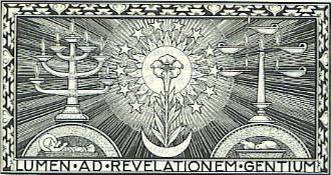
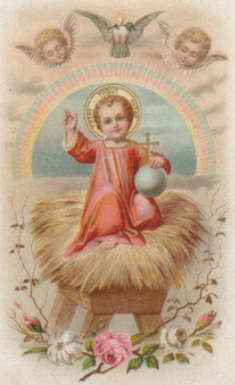
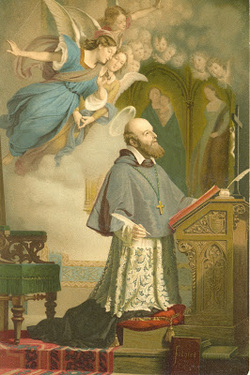
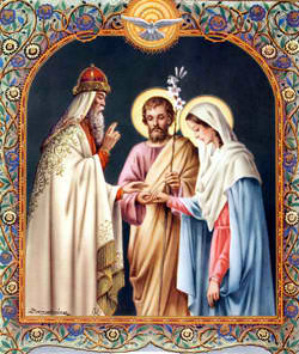
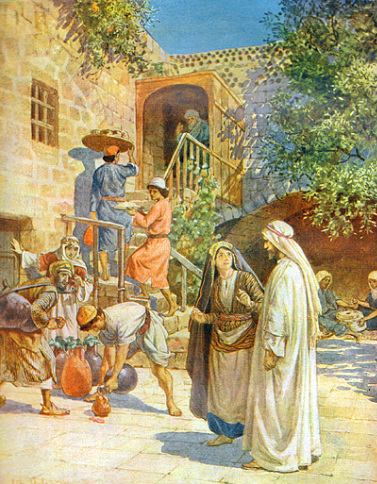


 RSS Feed
RSS Feed